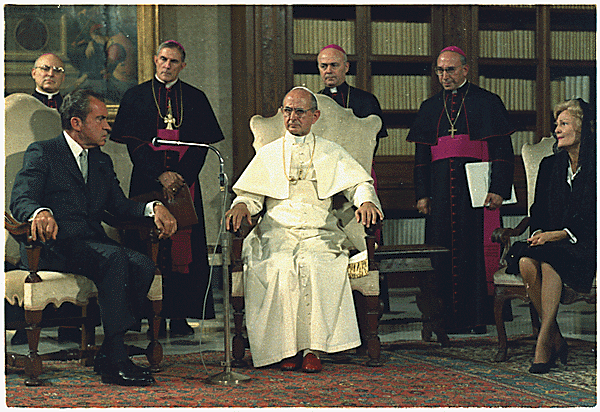At Fifty, Populorum Progressio Still Speaks to a World in Flux
2017 celebrates the fiftieth anniversary of one of the most important texts of Catholic social thought of the last century: Blessed Pope Paul VI’s Populorum Progressio (“On the Progress of Peoples”), which Pope Francis recently praised for its “felicitous” explanation of integral development as “development of each man and of the whole man.”
Paul’s letter has sometimes been dismissed as a long-winded document that uncritically embraced a 1960s, leftist read of the economy and of the causes of wealth and poverty. Typical of this mindset is Lord Brian Griffiths, vice-chairman of Goldman Sachs International, who has described Populorum Progressio as “the encyclical published by Paul VI in 1967, at the height of anti-capitalism in Europe. It attacked liberal capitalism, was ambivalent about economic growth, recommended expropriation of landed estates if poorly used, and enthused about economic planning.”
While Populorum has received its share of criticism, it has also been held up as a model of Catholic social thought done right—not so much for its prudential judgments on contingent economic realities, but for its enduring contribution to the Church’s understanding of development and progress.
Populorum Progressio bears the unique distinction of being the only social encyclical after Leo XIII’s Rerum Novarum to be commemorated by other encyclicals on important anniversaries. In other words, it became a permanent reference point for the Church’s social magisterium through the decades.
In 1987, twenty years after Populorum, Saint John Paul II released a first commemorative encyclical called Sollicitudo Rei Socialis, in which he called Paul’s letter a “distinguished encyclical” with “enduring relevance.” He pointed to the text as a new point of reference for Catholic social thought, alongside Rerum Novarum.
The purpose of this commemorative encyclical, John Paul said, was “to pay homage to this historic document of Paul VI and to its teaching” and “to reaffirm the continuity of the social doctrine as well as its constant renewal.”
Pope Benedict XVI went further still with the publication of Caritas in Veritate in 2009. In this second encyclical commemorating Populorum Progressio, Benedict expressed his conviction that “Populorum Progressio deserves to be considered ‘the Rerum Novarum of the present age.’”
This statement was very significant, since for decades Rerum Novarum had been considered the “Magna Carta” of Catholic social doctrine, and Pope John Paul II had written that Pope Leo had “created a lasting paradigm for the Church.”
While singling out Populorum Progressio as the new Rerum Novarum, Benedict underscored the unity and continuity of all Catholic social doctrine, and placed both Populorum Progressio and Caritas in Veritate in the line of his predecessors’ works. Benedict did not seek to place Populorum Progressio in a class by itself, but rather notes that the Pauline encyclical “would be a document without roots” if viewed outside of tradition of the apostolic faith.
Still, by honoring Populorum Progressio with the title of “the Rerum Novarum of the present age,” Benedict conferred on it a paradigmatic status not dissimilar to that enjoyed by Rerum Novarum throughout the twentieth century.
Populorum Progressio brought about an important conceptual shift in Catholic social thinking, by moving away from the worker question of Rerum Novarum (with its attendant concerns for just wages, private property, the working environment, and labor associations) to the broader and richer social benchmark of integral human development.
As a touchstone for Catholic social thought, integral human development is more central and encompassing than the labor question, and, in fact, comprises it.
Benedict held up this shift in focus—rather than Paul’s evaluation of specific development issues or practical solutions to those problems—as what led him to underscore Populorum Progressio’s importance for our age. Benedict played down Paul’s contingent judgments, noting that “an evaluation is needed of the different terms in which the problem of development is presented today, as compared with forty years ago,” while he summarized the substantive and enduring contribution of Populorum Progressio as revolving around the notion of integral human development.
The whole Church, in all her being and acting—when she proclaims, when she celebrates, when she performs works of charity — “is engaged in promoting integral human development,” Benedict wrote. In other words, human development stands at the very center of the Church’s mission, and everything the Church does can be seen as a service to this development.
Moreover, authentic human development “concerns the whole of the person in every single dimension.” The truth of development, Benedict stressed, “consists in its completeness: if it does not involve the whole man and every man, it is not true development.”
This, Benedict said, “is the central message of Populorum Progressio, valid for today and for all time.”
In his 2013 apostolic exhortation Evangelii Gaudium, Pope Francis, too, held up Populorum Progressio’s idea of the universality of true development, which he called Paul’s “principle of discernment.”
More recently, Francis said that this integral development means bringing together and integrating various sectors, “the economy, finance, work, culture, family life, religion,” each of which is “a fundamental circumstance for this growth.
“None of them can be an absolute, and none can be excluded from the concept of integral human development,” Francis said.
While Pope Leo’s important analysis of the worker question, along with his lengthy defense of private property, remains germane in our own day, Populorum Progressio moved the focus of Catholic social thought to the more central and encompassing notion of integral human development. In doing so, Blessed Paul VI made a significant contribution to the papal corpus that has stood the test of fifty years, and promises to be relevant for many more.
Thomas D. Williams is a Rome-based Catholic moral theologian, author and professor of Ethics at the University of Saint Thomas. His fifteen books include The World as It Could Be: Catholic Social Thought for a New Generation (Crossroad) and Who Is My Neighbor? Personalism and the Foundations of Human Rights (CUA Press). He’s also the Rome Bureau Chief for Breitbart.















